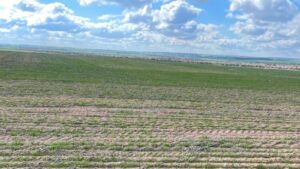STATUSISF
There’s a first time for everything. Recently, the International Seed Federation was faced with making an unprecedented decision: changing the dates of its annual World Seed Congress. Initially, the ISF World Seed Congress was scheduled to take place May 28-30, 2012 in Rio de Janeiro. However, the United Nations is holding its Rio+20 Conference on Sustainable Development June 4-6, 2012 in the same neighbourhood, Barra, as the ISF Congress. It is a large event, with around 50,000 participants including many heads of state expected from all over the world. Moreover, the third Preparatory Committee Meeting of the UN conference will be held in Rio on the same dates as the ISF congress.
As a result, the UN Rio +20 Committee and the Brazilian authorities have asked ISF and the Brazilian Seed Association, ABRASEM, to change the dates of the World Seed Congress, as they need the hotels in Barra. Holding the Congress in May as originally planned would have led to many inconveniences, including less or no accommodation available outside room-blocks, less or no flight availability, and airport closure and roadblocks in the event that high-level politicians attended.
The ISF secretariat has been working intensively with the Brazilian National Organizing Committee and the Professional Congress Organizers to find another time period in which to reschedule the ISF World Seed Congress. Taking into account other national and international meetings, the secretariat and NOC have selected June 26-28, 2012 as the new dates. Go to worldseed2012.com for more information.
Organizers realize this may bring a certain level of inconvenience to some of the delegates. However, taking into account the implications of the UN meeting, there was no other option than to move the dates. The NOC, PCO and ISF will do the utmost to limit any inconvenience.
—Ywao Miyamoto, president of NOC, and Marcel Bruins, secretary general of ISF
STATUSAUSTRALIA
The Australian Department of Agriculture and Food has bred a new lupin variety, PBA Gunyidi, which is resistant to pod shattering and higher-yielding than other varieties commonly grown in Western Australia. It is the first lupin variety to be released by Pulse Breeding Australia, a national research initiative sponsored by the Grains Research and Development Corporation and government breeding programs in Australia.
Bevan Buirchell, plant breeder and senior research officer who led the project, says the variety took 10 years to complete. “During that period the lines were tested for disease resistance, agronomic traits, herbicide resistance, quality parameters and yield,” says Buirchell. “We needed to test all these traits so that we could identify a line for release that was superior to existing varieties.”
Pod shattering occurs when mature pods split, releasing their seed—which can be disastrous for growers. “PBA Gunyidi will replace the variety, Mandelup, that if left too long after maturity shatters its pods and thus there is a substantial loss in yield,” says Buirchell. “PBA Gunyidi will allow farmers to continue to harvest their lupin crops after their cereal crops without this substantial loss of grain—a great advantage both in terms of operational activities on-farm and for protection of income.”
The reception to PBA Gunyidi has been excellent, according to Buirchell, “with many calls [from producers] to seed companies.” The variety will be available for the 2012 growing season and first released in Western Australia as well as New South Wales, Victoria and South Australia. Plans are also in place to test PBA Gunyidi in South Africa and possibly Chile.
STATUSISRAEL
A new technology for the swift insertion of specific genetic materials into seeds, called TraitUP, has been developed by Ilan Sela and Haim Rabinowitch of the Robert H. Smith Faculty of Agriculture, Food and Environment of the Hebrew University in Jerusalem. The university’s technology transfer company, Yissum Research Development Company Ltd., has signed an agreement with Morflora Israel Ltd. for the development of the technology.
According to Rabinowitch, TraitUP complements plant breeding, facilitates the improvement and introduction of new traits into existing varieties, and does not alter the DNA of plants, but allows the expression of particular traits throughout the entire plant when genetic material is introduced to the seed. Yissum states that, “specific vectors serve as carriers to introduce desired genes into seeds in a fast and efficient way,” and according to Rabinowitch, the technology can be used in multiple plant species.
“We have clear indications that the technology is universal,” he says. “The spread of the vector, including its genetic load and the expression of the genetically functioning unit, are evident in 45 plant species of 12 plant families.”
Rabinowitch, Sela and Dotan Peleg, chief executive officer of Morflora, assert that the technology should be seen as an “enhancing and enabling” technology rather than a direct alternative to transgenic technologies. “TraitUP is more than just an alternative to transgenic technologies; it’s a technology which brings some entirely new capabilities to the industry,” says Peleg.
“As far as regulatory concerns, the TraitUP technology is still at the pre-regulatory phase, yet we assume it is most likely to be considered as non-GMO, since it does not modify the genome of treated plants. As such, it may well be an alternative technology with a unique regulatory status which will enable its usage in some GMO restricted markets.”
TraitUP is expected to become available in two years, with the first products released in three to four years.
STATUSUK
With an increasing urgency to answer the challenges of global issues such as food security and climate change, a new unified body has been set up by the Society of Biology. The UK Plant Sciences Federation incorporates a vast range of plant science researchers, educators and industries. The group will bring an inclusive and comprehensive dialogue across the plant and crop science community.
UK PSF will play a role in meeting the needs of an increasing global population. In a world with a current population of seven billion people, underpinning research into plant science and crop production and its delivery through a vibrant commercial sector is more important than ever. UKPSF is committed to the integration of research and development to meet these challenges in an environmentally sustainable manner.
UK PSF can only meet its potential through stronger engagement within and beyond the plant science community. For the first time, the breadth of the UK Plant Science sector is being brought together—basic research, applied research, outreach, industry and education in a unique new structure.
“Plants are rightly returning to centre stage of food policy for many reasons: health, environment, climate, land use, and biodiversity,” said Tim Lang, professor of food policy at City University London, in a recent press release.













